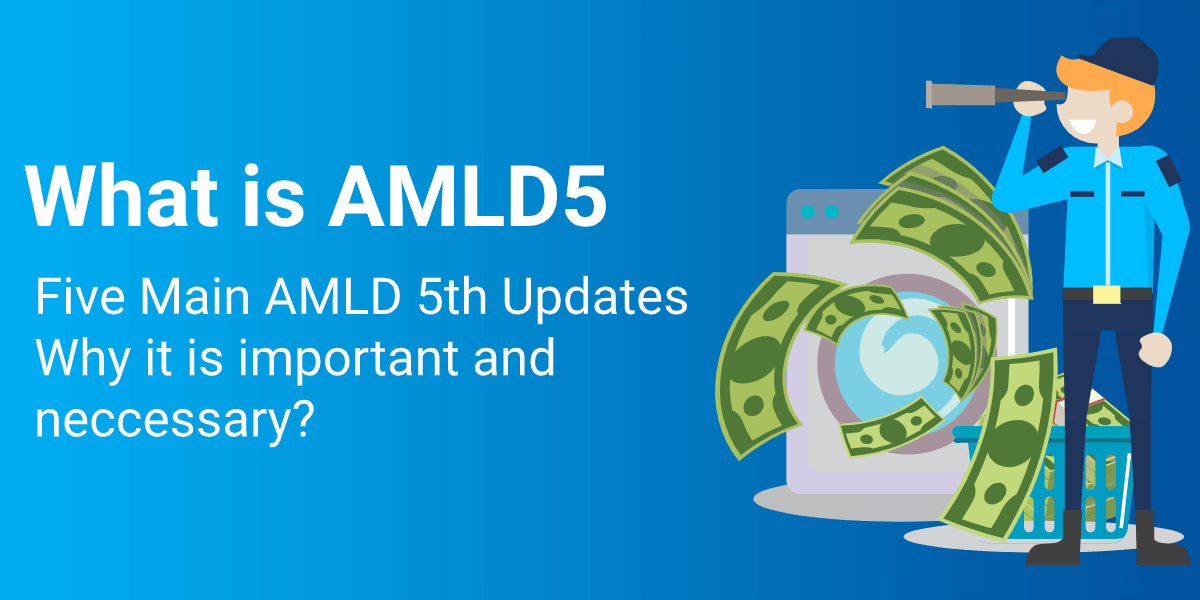The Danske Bank case, Panama papers, and Paradise leaks are some money laundering scandals that have taken the world by storm. Such revelations of fraud have compelled governments and regulatory authorities across the globe to take rigorous steps to counter money laundering and terror funding concerns.
As money launderers are now taking distinct approaches to clean their illicit funds, lawmakers need to amend the existing anti-money laundering policies and laws to make them more powerful to cope with new money-laundering techniques.
In the effort, On June 19, 2018, the European Commission enforced its 5th Money Laundering Directive, called AMLD5. All EU member states must follow this regulation.
Let’s find out what exactly AMLD5 is.
What is AMLD5?
AMLD5 stands for the Fifth Anti-Money Laundering Directive. It’s a European Union directive aimed at strengthening regulations and measures to prevent money laundering and the financing of terrorism. AMLD5 expands the scope of previous directives to include virtual currencies, prepaid cards, and other emerging financial technologies, requiring increased transparency and due diligence from financial institutions and businesses to prevent illicit financial activities.
The AMLD5 directive amends the 4th Money Laundering Directive, which was intended to prohibit the usage of the financial sector for terrorist funding and money laundering. AMLD5 aims to abolish financial crimes without making any significant changes to the functioning of the financial system.
EU decided to introduce the AMLD5 directive after the outbreak of high-profile political scandals and terrorist attacks all across Europe.
Key Facts About AMLD5
AMLD5 introduces five fundamental reforms that are majorly impacting the Know Your Customer (KYC) processes and crypto services:
- Scope and Regulation of Virtual Currencies: AMLD5 extends the scope of regulation to include virtual currencies and custodian wallet providers. It requires these entities to conduct customer due diligence and report suspicious activities.
- Prepaid Cards and E-Wallets: AMLD5 brings prepaid cards and electronic wallets under the scope of AML regulations, requiring customer verification for their issuance and use to prevent misuse for illicit activities.
- Centralized Beneficial Ownership Registers: AMLD5 mandates EU member states to establish centralized registers containing information about beneficial ownership of corporate entities, making it easier to access and share this information for law enforcement and regulatory purposes.
- Politically Exposed Persons (PEPs): AMLD5 expands the definition of PEPs to include domestic PEPs, thereby increasing the scrutiny of individuals with prominent public functions at the national level.
- High-Risk Third Countries: AMLD5 introduces a list of high-risk third countries that pose significant money laundering and terrorist financing risks, requiring enhanced due diligence for transactions involving these countries.
EU Directive is a regulation by the European Union for all its members. Each country is allowed to formulate its laws to meet the directive’s goals successfully. Although similar to FATF’s 40+9 Recommendations, EU directives are not legally essential to follow. Failing to adhere to them may cause members to pay fines.
5 Important AMLD5 Updates Compared to AMLD4
-
Purchase Identification
The threshold amount has been lowered to identify maximum e-money and prepaid card buyers.
-
PEP Screening
All EU members need to create a list of their public officials to recognize politically exposed persons (PEPs). Under this new directive, all the political people will be listed who are in formal or informal political power.
-
Obliged Entities
All the individuals and businesses that follow EU directives come under the “Obliged Entities.” These include banks, insurance companies, investment firms, credit institutions, and any other financial services. After the AMLD5 directive update, custodian wallet service providers and crypto companies will be counted as obliged entities.
-
UBO Register
The EU UBO register will be accessible to the public. For those who don’t know, the UBO Register is a national database that maintains accurate and up-to-date information about ultimate beneficial owners (UBOs). Moreover, the register will also add information on trusts and similar organizations that were free from this rule earlier. It will give the general public access to more accurate information on all EU companies and organizations.
-
Customer Due Diligence
Also known as CDD, it is the process in which relevant information about the client is accumulated and checked for any potential risks related to terrorist funding, money laundering, etc. This new update states that CDD will be necessary for all high-risk third countries.
Related: What is the Difference Between CDD and EDD?
Other AMLD5 Policy Updates You Should Remember
- A lower transaction threshold for e-money and top-up cards has decreased from €250 to €150.
- Since custodian wallet providers and crypto companies will be regarded as “obliged entities”, they must comply with the same AML/CFT, KYC, and data-sharing requirements set for traditional financial institutions.
- All the crypto companies will be registered with the legal authorities of EU members.
- Businesses that are involved in financial transactions with countries listed by the EU will need to follow additional compliance checks, take mitigation measures, and conduct additional supervision.
- Art dealers and real estate agents who are involved in the distribution of goods across the country will be treated as obliged entities if the total volume of their sale reaches € 10,000.
- All the businesses that are dealing with high-risk third countries must carry out EDD (Enhanced Customer Due Diligence).
- Financial companies will comply with the eIDAs, which means checking customers’ identities for due diligence procedures. eIDAs also defines which electronic identification solutions can be utilized for KYC purposes.
- AMLD5 states that monitoring for complex and large transactions, especially those that have unusual patterns, must be increased.
- All EU nations must keep their national public office database up-to-date and functional to detect politically exposed persons.
Considering everything together, it wouldn’t be wrong to say that if all European members strictly comply with this new EU directive, it can play a significant role in stopping terror funding and money laundering activities. This regulation is better than the earlier guidelines because it does not replace the existing legislation (AMLD4). Instead, it makes it more potent with minor yet important changes.
If you’re into any business that requires you to comply with AMLD5/AMLD6 and other EU directives, we advise you to consult RegTech professionals, as a small mistake can lead to a big headache later.
iDenfy is an identity verification startup committed to helping businesses meet compliance regulations. We provide you with a wide range of solutions for ID scanning, ID verification, facial recognition, liveness detection, PEP and Sanctions screening, and more.
For any help regarding AML compliance, you can seek our assistance free of charge.




